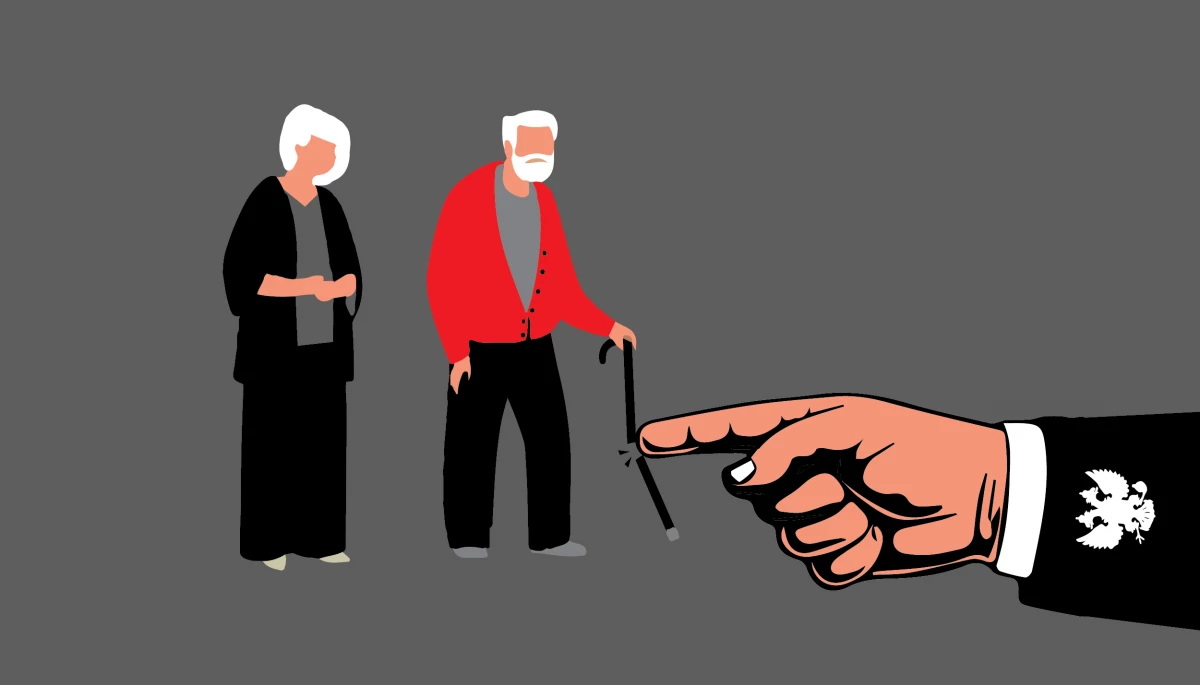Українською читайте тут.
Russia's armed attack on Ukraine endangered the lives of the elderly and the observance of their rights. According to the UN, although older people (60 and over) make up 25% of the country's population, they accounted for about a third of the civilians killed in the first year of the full-scale war. At the same time, some died because they were forbidden to bring medicine or leave the basements. Elderly people are often forced to live in harsh security conditions. They cannot quickly relocate, which prevents them from getting to a safe place without hindrance during Russian attacks. Because of the war, many elderly men and women are forced to live in faulty or dilapidated housing. Thousands of displaced elderly people, who have no relatives left and who were evacuated from frontline settlements live in overcrowded state institutions. The UN has found that elderly people have been particularly hard affected by the electricity power cuts due to Russian attacks on critical infrastructure, effectively leaving them trapped in their upper-floor apartments when elevators stopped working due to blackouts. According to an Amnesty International study, some elderly remained in their homes in the frontline area because evacuation information was less accessible to them.
Eld living below the poverty line
According to the age structure, Ukraine is an "old" country: according to the National Academy of Sciences, a quarter of the population is over 60. In addition, according to Lyudmyla Denysova, the Verkhovna Rada Commissioner for Human Rights, about 80% of pensioners live below the poverty line. Before the full-scale invasion, as of January 1, 2022, the average pension was UAH 3,991 or USD 147. Currently, the average pension is UAH 5,350 ($146). Around 3.57 million pensioners receive it every month. Another 29%, or 3.08 million Ukrainians, receive pensions from 2 to 3 thousand UAH (less than $100). Many elderly people spend a large part of their pension on medicine and paying for utilities because government subsidies do not always compensate for it. Social policy in Ukraine is characterized by a constant reduction in state aid, in particular to pensioners. In addition, Oleksandr Kitral from the "Spilne. Commons" publication mentions that the current joint pension system is in crisis because the Pension Fund's income, as "Economichna Pravda" writes, does not provide expenses for paying pensions. Furthermore, the savings system implemented today turns pensions from public property into private investment, which is constantly threatened by regular "burn down" in Ukrainian realities. In the 1990s, in the countries of Central and Eastern Europe, according to Hryhoriy Ovcharenko, the head of the local asset management division of the ICU group, such a reform failed: most of the states were unable to ensure the growth of the income of the accumulative pension.
Russian propaganda has systematically manipulated the issues of the elderly in Ukraine to show that the authorities are allegedly "lowering" the living standards of the elderly by keeping pensions at a meager level, canceling subsidies, and raising the retirement age.
Russian propagandists also accused Ukraine of not seeming to care about people of retirement age in the temporarily occupied territories because it [the state] does not pay them a pension. In the summer of 2014, more than 1.2 million pensioners were registered in the regions of eastern Ukraine not controlled by the Ukrainian state. Since March 2014, Ukraine has stopped payments to state employees in Crimea and, since mid-summer 2014, in territories taken over by Russian mercenaries. It was possible to receive money only if the pensioners moved to the region under the control of the Ukrainian authorities. "The banking system in the uncontrolled territory does not work. Therefore, it is necessary to travel [to receive it]", — wrote the BBC concerning the Donetsk regional administration. In 2016, the Cabinet of Ministers launched a mechanism to check temporary migrants to avoid so-called "retirement tourism". At that time, the Ministry of Social Policy and the Ministry of Internal Affairs studied whether the resettled pensioners lived at the registration place in the Ukraine-controlled territories. Pensioners had to confirm their residence in the controlled territory once every two months. The pension payment was suspended if a person left the occupied territories for more than 60 days.
The number of pensioners in territories not controlled by Ukraine has been constantly decreasing. For example, in December 2018, 562 thousand pensioners (out of more than 1.2 million registered for the summer of 2014) whose residence was reported in the occupied territories continued to receive pensions. Coordinator of UN systems in Ukraine Neil Walker and UN special rapporteur Chaloky Beyani urged Ukraine to pay pensions to all citizens regardless of where they live and whether they are temporary migrants. In 2018, by the decision of the Supreme Court, payments to them were renewed, but the debt remained. In 2021, the government managed to unblock the debt payment of UAH 11.2 billion for Donbas pensioners.
How Russian agitational propaganda manipulates the situation
In light of this situation, Russian propagandists pursued several manipulative information narratives.
First of all, the "budget" of the pro-Russian terrorist administrations in the east of Ukraine is supposedly capable of paying its pensions. According to Oksana Taran, the "deputy minister of finance" of the occupational administration of the annexed territories of the Donetsk region, it is possible not from funds "provided by Russia, but due to the taxes collected from local businesses."
Secondly, Putin was allegedly so "worried" about the Ukrainian pensioners who happened to be included in the legal field of Russia that, as Vedomosti reports, "ordered" to integrate them into the Russian pension system immediately: "The way you will do it is up to you. Together with the deputies of the State Duma, think about it and do it [integrate the Donetsk pensioners into the Russian pension fund]. Don't delay it, and do it as soon as possible."
Thirdly, the propaganda publication Ukraina.ru stated that the pensioners of the temporarily occupied territories seem to have a much better life than their peers from the territories controlled by Kyiv: "Now that the prices have equalized, the pensioners of the "Ukrainian" Donbas look at the "republicans" [Donetsk and Luhansk People’s Republics] with envy. They are envious."
Afterward, Russia also used manipulations regarding the amount of payments. Although the "Ukrainian" pensions were much higher than those paid by the occupying pro-Russian terrorist administration in the occupied territories in the east of Ukraine, the propagandists proved that the Pension Fund of Ukraine "deliberately" understates pensions for residents of the occupied territories. Such statements were intended to establish that Ukraine abandoned its citizens and, at the same time, to present Russia as a "social" state "with high standards of living" for people of respectable age.
Propaganda also tried to impose a false impression that the life of a pensioner in the territories occupied by Russia is better than that of residents of the territories controlled by Kyiv — in the occupation, "the pensions are higher" (mainly if you accept Russian citizenship), and "the utility bills are lower", and "the goods are more affordable".
The Kremlin spokespeople used this manipulative line, particularly from the pool of currently sanctioned former parliamentarians, such as Viktor Medvedchuk and Taras Kozak. According to Mila Krutchenko, Chief Strategy and Digital Officer of RAZOM group, as of December 2021, the audience aged 55 and over is more than 10.5 million Ukrainians. For them, TV is often almost the only source of information about current news. Taking advantage of this, the propagandists methodically repeated the statement that during the prime ministership of Mykola Azarov, convicted of high treason, subsidies and pensions were more elevated than after the Revolution of Dignity [Maidan], and the Kyiv authorities worked for the agreement of the International Monetary Fund and "Western curators", the goal which is to cut the entire social network.
In addition, Russians were using the nostalgia for the USSR topic as an attempt to reanimate the "Soviet identity" and to tune the audience, if not against the independence of Ukraine or the current government (as a maximum goal), then at least to form a favorable attitude towards Russia, which declared itself the rightful successor of the USSR. In this way, agitational propaganda instrumentalized the malleability and gullibility of the older audience, trying to gain political advantage from it.
As the full-scale invasion has begun, propagandists continue to spread fake news about and for the elderly. The topic of "pension" was renewed after the de-occupation of Ukrainian territories. According to Russian propaganda, the Russian social security system is "better than the Ukrainian one", and the occupation government takes "better" care of the elderly than the Ukrainian one. Russians started cultivating the statement that Ukraine does not care about the older people from the frontline areas; no one helps them, while "volunteers" in the territories seized by Russia provide the elderly with everything they need.
Fakes are spreading that the Ukrainian army is shelling humanitarian missions intended for elderly people in the occupied Luhansk region and Donetsk region. In addition, information about the evacuation of elderly people from the frontline areas was presented in a negative light. According to Russian propaganda, volunteers do it without the people’s consent, take them to God knows where, and then they are forced to go through strict filtering to get to relatively safe areas. Agitational propaganda encourages elderly people in the newly Russia-occupied Ukrainian territories to get passports with a double-headed eagle. It later cheerfully reports about it, saying that "the oldest man of town X received a Russian passport from the mayor’s hands."
Detector Media researchers analyzed almost 28,000 messages from the Ukrainian segment of social networks (Telegram, Facebook, YouTube, X) to single out key propaganda trends directed at older people. Read the full text of the study on our website soon.
Image collage credits: Detector Media



